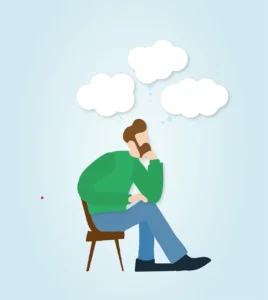Intrusive vs impulsive thoughts OCD : exploring mental health” blog will explain how thoughts arise like whispers in the maze of the human mind; they are frequently intrusive and impetuous, but they may also be soft and inviting. Navigating the complexity of our inner world requires an understanding of the subtle differences between impulsive and intrusive thoughts. We examine the meanings, expressions, and coping mechanisms of these two categories of thoughts in this investigation.
Intrusive thoughts OCD
Unwanted, automatic, and frequently unsettling thoughts, pictures, or impulses that trespass into awareness are known as intrusive thoughts.  Disturbances and distress can be caused by them, which can vary from brief irritations to enduring fixations. Sexuality, violence, injury, and taboo subjects are common themes. Obtrusive thoughts are a common occurrence in human life and may not always indicate one’s genuine intents or goals, despite their disturbing character.
Disturbances and distress can be caused by them, which can vary from brief irritations to enduring fixations. Sexuality, violence, injury, and taboo subjects are common themes. Obtrusive thoughts are a common occurrence in human life and may not always indicate one’s genuine intents or goals, despite their disturbing character.
Understanding impulsive thoughts
Conversely, impulsive thoughts are typified by strong desires or inclinations to do action without thoroughly weighing the implications. They can result in rash decisions or actions that you may come to regret later since they develop spontaneously. Bypassing logical mental processes, impulsive ideas are frequently the result of emotional triggers or a need for instant fulfilment. Some degree of impulsivity is normal, but too much of it can cloud judgment and have unfavourable effects.
Intrusive vs impulsive thoughts OCD difference
There are important differences between impulsive and intrusive ideas, even if they may occasionally overlap. While impulsive thoughts appear as desires or impulses to act, intrusive thoughts usually entail unwelcome and uncomfortable mental content.

Furthermore, impulsive ideas might be accompanied by excitement or impulsivity, whereas intrusive thoughts frequently cause guilt or distress. Recognising these distinctions can assist people in properly identifying and addressing each category of thought.
Expression of intrusive thoughts OCD
There are several ways that intrusive thoughts can appear, including:
1. Obsessions: Recurrent, upsetting ideas or visions that are difficult to ignore or repress. Obsessions with invasive sexual ideas, safety concerns, or contamination anxieties are common.
2. Compulsions: Repetitive actions or thoughts carried out to reduce anxiety or stop imagined damage in reaction to intrusive ideas. Excessive hand washing, ritual checks, and mental counting are a few examples.
3. Hypervigilance: An increased awareness of possible threats or hazards, resulting in a continuous search of the surroundings for warning indications of impending danger. Anxiety levels can rise and intrusive thoughts can worsen in this hyperarousal condition.
4. Rumination: An excessive amount of time spent thinking back on past mistakes, perceived failures, or incidents; frequently accompanied by emotions of worthlessness and self-criticism. Rumination can sustain unfavourable mental habits.
Triggers and causes of intrusive thoughts OCD
Several things can cause intrusive thoughts ocd , such as:
1. Stress: By decreasing cognitive performance and reducing inhibitions, high levels of stress or worry might increase vulnerability to intrusive thoughts.
2. Trauma: Adverse events from the past, such as maltreatment, mishaps, or seeing violence, can leave a permanent mark on the psyche and play a role in the development of intrusive thoughts.

3. Mental Health Disorders: One of the main symptoms of many mental health disorders is intrusive thoughts. These disorders include generalized anxiety disorder (GAD), PTSD, and obsessive-compulsive disorder (OCD).
4. Substance Abuse: Using drugs or alcohol can change the chemistry of the brain and make intrusive thoughts worse, especially in those who are already mentally ill.
Signs of impulsive thoughts OCD
Impulsive thought patterns can appear in a number of ways, such as:
1. Sudden Urge to Act: An intense, frequently overwhelming want to act in a certain way without thinking through the possible repercussions.
2. Risk-taking Behavior: In the quest for instant fulfillment, impulsive thoughts can result in impulsive behaviors like reckless driving, drug misuse, or overspending.
3. Emotional Reactivity: Strong feelings like rage, impatience, or enthusiasm can cause impulsive thoughts that in turn cause impulsive acts or outbursts.
4. Difficulty Delaying Gratification: People who have impulsive ideas may find it difficult to control their impulses and delay gratification, which can result in impulsive decision-making.
Triggers and causes of impulsive thoughts
Numerous things might cause impulsive thinking, such as:
1. Emotional dysregulation: Impulsive ideas and actions can become more likely when emotions like anger, impatience, or worry are difficult to control.
2. Environmental Triggers: By appealing to cravings for pleasure or fast fulfillment, outside stimuli like peer pressure, advertising, or social media influence can set off impulsive thoughts.
3. Neurobiological Factors: Individuals may be predisposed to impulsivity and impulsive thinking due to variations in brain chemistry or functioning, such as abnormalities in neurotransmitters like dopamine or serotonin.
4. Personality features: Impulsive ideas and actions might arise as a result of certain personality features, such as sensation-seeking or poor impulsive. control.
Personal experience with intrusive vs impulsive thoughts OCD
- I have personally experienced intrusive and impulsive thoughts that have weaved a complex tapestry throughout my everyday existence. One thing that has kept happening to me is the constant, compulsive need to wash my hands, even when there was no good reason to.This urge, which was the result of a long-standing dread of contamination, frequently made me feel stuck in a loop of doubt and anxiety.
- I would scrub my hands raw for hours on end, hoping to convince myself that there was nothing wrong with them, but all I would get is a brief respite until the whole thing started again.
- Similar to this, the needless double- and triple-checking of items has caused aggravation and distress.
- The constant hesitation that accompanied my activities, such as making sure I had locked the door or turned off the stove, seemed to be unquenchable and was pushing me towards obsession.
- The worry of coming across a snake, rat, or bat in the aisles would cause me to become extremely vigilant, even in settings as benign as grocery shopping, and I would have to carefully go through every shelf.
- I was frequently left feeling alone and ashamed by these bothersome ideas as I tried to understand their inexorable hold on my thinking. I didn’t start to feel better until I consulted a specialist and started to sort through the complex web of my ideas.
I was able to confront the false assumptions that underlie my intrusive thoughts and create more constructive coping strategies to deal with them through counselling and medication. I’ve learned that, despite the difficult path I’ve taken, my identity is determined by the way I choose to handle my intrusive and impulsive impulses.
I have developed a route for healing and self-discovery and have gained more understanding of the intricacies of my mind by embracing self-compassion and resilience. Even though I still have to fight against intrusive and impulsive thoughts, I now have the knowledge and skills necessary to deal with them bravely and gracefully.
